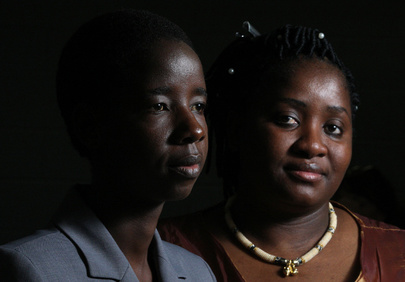AFRICA: Women Do 'So much,' But Still Need Our Help
Men are many things, but there is at least one thing they are not. They are not women.
For Nonhlanhla (“Call me Noni”) Dlamini, that is a problem. “At the end of the day, men do not fetch water,” the high-spirited and dauntingly articulate African politician declared “Men do not do the cooking.”
So why is the elite club of 20 world leaders convening in Toronto later this week composed almost entirely of, to put it bluntly, men? Dlamini would like to know. “First and foremost, we want to have women at the table,” she told a gathering of like-minded women — and men — at Ryerson University. “We want to have women represented. ”And not only that. Where, she asked, is Africa?
Only one of the G20 nations that will be represented here — South Africa — is located on the globe's most impoverished and possibly most overlooked continent. “People think Africa is just a gloomy country, where no one is doing anything,” she said. “There is so much we are doing.”
Married with two daughters, aged 5 and 12, Dlamini is also a political whirlwind. Two years ago, she swept aside no fewer than seven male adversaries to win election as the member of parliament for the Ludzeludze constituency in the Manzini region of the landlocked southern African kingdom of Swaziland, one of just seven women to join the assembly via the ballot box.
The country's hereditary ruler, King Mswati III, appointed two additional women to the 65-seat chamber, for a total of nine women among 56 men.
Dlamini has barely stopped moving since. “We have somehow made the men feel threatened in some way,” she said, indicating by her tone that this is a good thing. “They feel we are invading their space.”
A large woman with a stirring voice, an electrifying manner and a wardrobe to match, Dla mini, 39, was in Toronto to promote the issues she thinks the world's leaders should be talking about when they converge on this city.
mini, 39, was in Toronto to promote the issues she thinks the world's leaders should be talking about when they converge on this city.
Poverty. Sexual abuse. Pedophilia. HIV/AIDS. Unemployment. Gender inequality.
These, for Dlamini, are the challenges that really matter to Africa's girls and women, who almost invariably suffer the worst effects of the region's troubles.
Dlamini was supported in her appeal by a Zimbabwean community worker named Shuvai Mandigo, 30, whose oratorical style was less flamboyant but no less persuasive.
The two women took turns chronicling a depressing litany of domestic violence and sexual abuse.
“Many girls are being abused at a very early age,” said Mandigo, who organizes roughly 400 after-school meeting groups for girls aged 9 to 18 in Zimbabwe.
The central purpose of the groups, called Girls Empowerment Clubs, is to educate the participants about their rights as females and as humans — no easy task in a country notorious for state-sanctioned violence against its citizens.
“Despite all these challenges, we've been trying to advocate for women's rights,” said Mandigo.
She and Dlamini agreed the AIDS pandemic raging through Africa has dramatically raised the stakes for women.
Now, as well as the other trauma they must suffer, the victims of sexual abuse in much of Africa are apt to contract a lethal and incurable disease as well.
Worse, a bizarre belief flourishes among HIV-positive African males that they can cure their condition by having sex with a virgin.
“It's a common problem,” said Dlamini. Girls as young as 18 months old — months, not years — are being raped, she said.
Meanwhile, the Swazi king has 14 wives, and women in the country are legally classified as minors.
The tw. o women's Toronto visit was sponsored by Canadian Crossroads International, an NGO that promotes gender equality and community development primarily in southern Africa.
Photosource: Steve Russel/ Toronto Star
PeaceWomen.org is a project of the Women's International League of Peace and Freedom, United Nations Office.
Fair Use Notice: This page contains copyrighted material the use of which has not been specifically authorized by the copyright owner.
PeaceWomen.org distributes this material without profit to those who have expressed a prior interest in receiving the included information for research and educational purposes.
We believe this constitutes a fair use of any such copyrighted material as provided for in 17 U.S.C § 107.
